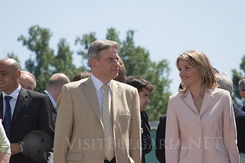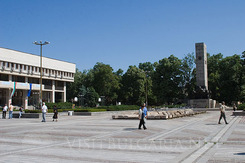Over one billion euro has been invested in the wellness and spa industry in Bulgaria over the past more...
| Search | Hotels / Accommodation | Vacations | Tours & Trips | Rent A Car | Transport | Flights | Conferences | Press Centre | Yachting |
- Hotels & Accommodation in Vidin



- Anna Kristina
- Avramov Hotel
- Dunav hotel
- Neptun Hotel
- The Old Town
- Vidin Hotel
- Nearby hotels



- Danubia Beach Hotel
- Vidin Guide
- Early booking in Vidin
- All inclusive in Vidin
- Last minute in Vidin
- Hotels in Vidin
- Apartments in Vidin
- Villas in Vidin
- Rural houses in Vidin
- Vacations in Vidin
- Transport To Vidin
- Tours in Vidin
- Conferences in Vidin
- Articles on Vidin
- News From Vidin
- Baba Vida Fortress
- Magura Cave
- The Rabisha lake
- Holidays in Bulgaria
- All inclusive
- Beach
- Birdwatching
- Golf
- Health
- History
- Hunting
- Monasteries/ Religious
- Mountain biking
- Prom
- Rural
- Ski
- Spa & Wellness
- Trekking
- Water sports
- Weekend breaks
- Wine
- Conference
- Children Holidays
- Yachting
- Events
- Type of accommodation
- Hotels
- Apartments
- Villas
- Rural houses
- Destinations
- Aheloy
- Ahtopol
- Albena
- Apriltsi
- Arbanassi
- Asparuhovo
- Assenovgrad
- Bachkovo Monastery
- Balchik
- Bankya
- Bansko
- Banya (Karlovo)
- Banya (Razlog)
- Batak
- Beklemeto
- Belchin Bani
- Beli Iskar
- Belogradchik
- Berkovitsa
- Blagoevgrad
- Bodrost
- Bojichen
- Borovets
- Botevgrad
- Bourgas
- Bozhentsi
- Bratsigovo
- Brestovitsa
- Buzludja
- Byala
- Chepelare
- Cherepish Monastery
- Chernomorets
- Chiflik
- Devin
- Dimitrovgrad
- Dobarsko
- Dobrich
- Dobrinishte
- Dolna Banya
- Dospat
- Dryanovo
- Dupnitsa
- Dyuni
- Elena
- Elenite
- Elhovo
- Gabrovo
- Gela
- Golden Sands
- Gorna Oryahovitsa
- Gotse Delchev
- Govedartsi
- Grand Hotel Varna
- Harmanli
- Haskovo
- Haskovo Mineral Baths
- Hissarya
- Ivaylovgrad
- Kalofer
- Kamchia
- Kamen Bryag
- Kardjali
- Karlovo
- Kavarna
- Kazanlak
- Kiten
- Kom
- Koprivshtitsa
- Kosharitsa
- Kostenets
- Kostenkovtsi
- Kotel
- Kovatchevitsa
- Kranevo
- Kresna
- Kulinoto
- Kyustendil
- Lom
- Lovech
- Lozenets
- Lukovit
- Lyaskovets
- Madara
- Malko Tarnovo
- Malyovitsa
- Melnik
- Mezdra
- Momchilovtsi
- Montana
- Narechen Baths
- Near Golden Sands
- Nessebar
- Obzor
- Ognyanovo
- Osogovo
- Pamporovo
- Panagyurishte
- Panichishte
- Parshevitsa
- Pavel Banya
- Pavlikeni
- Pazardjik
- Pernik
- Petrich
- Pirdop
- Pleven
- Pliska
- Plovdiv
- Pomorie
- Pravets
- Preslav
- Primorsko
- Ravda
- Razgrad
- Razlog
- Ribaritsa
- Rila Monastery
- Riviera
- Rousse
- Rusalka
- Samokov
- Sandanski
- Sapareva Banya
- Semkovo
- Sevlievo
- Shabla
- Shipka
- Shipkovo
- Shiroka Laka
- Shkorpilovtsi
- Shoumen
- Silistra
- Sinemorets
- Sliven
- Smolyan
- Sofia
- Sopot
- Sozopol
- Srebarna
- St. Constantine & Elena
- Stara Zagora
- Starozagorski Baths
- Sunny Beach
- Sunny Day
- Sveti Vlas
- Svilengrad
- Svishtov
- Targovishte
- Teteven
- Tran
- Trigrad
- Troyan
- Tryavna
- Tsarevo
- Tsigov Chark
- Uzana
- Varna
- Varshets
- Veliko Tarnovo
- Velingrad
- Vidin
- Vitosha
- Voneshta Voda
- Vratsa
- Vratsata Gorge
- Yagoda
- Yakoruda
- Yambol
- Zlatitsa
- Zlatograd
- Bulgaria Guide
- General information
- Bulgarian Monasteries
- SPA Bulgaria
- The Black sea
- History
- Geography
- Maps
- Weather
- Airports in Bulgaria
- Webcams
- Forums
- Mountains in Bulgaria
- The Balkan Mountain Range
- Rila Mountain
- Pirin Mountain
- The Rodope Mountain
- Vitosha Mountain
- Travel Arrangements
- Visit Bulgaria
- Visa Requierments
- Choose Destination
- Flights to Bulgaria
- Transport in Bulgaria
- Advice
- Currency
- Official Holidays
Subscribe to newsletters to receive our hottest offers:
| Home > Vidin > News |
Bridge across the Danube raises hope not only among drivers

Vidin, Bulgaria - Bulgaria and Romania agreed that they need a second bridge across the Danube, signed a contract to construct it seven years ago, but actually started building it only this week.
'We have been waiting for this bridge for years,' Bulgarian truck driver Nikolay Haylesov says angrily. His comment reflects the view of thousands of his colleagues from across Europe.
Now drivers wait up to 12 hours to be ferried between Calafat in Romania and Vidin in Bulgaria, a bottleneck on the Pan-European Corridor Four, from Berlin via Vienna to Thessaloniki and Istanbul.
 Yet for many professionals it is still faster and cheaper than the corridor to the west, through Croatia, Serbia and Macedonia, because in Romania and Bulgaria they remain within EU and pass all borders with a single set of documents.
Yet for many professionals it is still faster and cheaper than the corridor to the west, through Croatia, Serbia and Macedonia, because in Romania and Bulgaria they remain within EU and pass all borders with a single set of documents.
The only other bridge on the 430-kilometre stretch of the Danube shared by Romania and Bulgaria is at Giurgiu and Ruse, far to the east.
Bulgarian Prime Minister Sergey Stanishev ceremoniously shovelled some earth on a field near Vidin on Sunday. Bulldozers will however not start roaring into action until next autumn, with the completion target date in 2010.
The 230 million euros (311 million dollars) would connect the highway and railway now ending on the riverbanks and open a shorter, EU-only route for transport.
Most of the financing for the construction, with two lanes going in each direction and a single railroad track spanning 1971 metres across the Danube, was secured by EU, the European Investment Bank and international lending institutions.
Not only drivers expect the bridge to make their life easier - in Vidin, a town 230 kilometres north of Sofia, inhabitants hope it would turn around their moribund economy.
Many farmers still use horses for work instead of tractors in the empoverished area of Vidin, which has lost a third of its 80,000 inhabitants through economic migration since 1989.
'I can't find work, but I must support my son, a student in Sofia,' says one widowed teacher who works as a cleaning lady when the job is offered.
A jobless geologist survives by selling entry tickets to the medieval castle Baba Vida and hopes that more tourists would visit 'once the bridge is finally there' in 2010.
The large number of new brass plates advertising real estate agents, lawyers and notaries is the early sign of the expected economic turnaround.
Their services are in demand along with the heating demand for land both in the town and along the path of the E79 highway that would lead to the future bridge.
The price of homes and lots, which has soared in Sofia and on the Black Sea coast over recent years, has now also started growing rapidly in the Vidin area, in Bulgaria's northwestern corner.
Among those who already pushed their head through the door is the French carmaker Citroen, which opened a showroom in Vidin, while a German food retail chain has started building a supermarket.


















